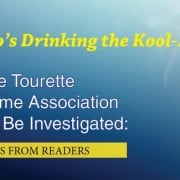Our Family’s Answer: A Nutritional Approach to Tourette Syndrome
The First Signs
As parents, we thought Kirk was just being a cute preschooler. He had some tics and unusual movements: he would chirp, whistle, skip, jump up to try and touch the door facing, nod his head, and sometimes twirl around while walking. He often raised his eyebrows, and we trimmed his bangs, thinking that was the cause. But by the time he was six, we began to worry that perhaps there was more to these “habits,” as we called them, than we understood. We had begun debating what type of doctor we should take him to when an article on Tourette syndrome (TS) appeared in the Sunday Parade magazine. Remarkably, it allowed us to make our own diagnosis and also provided information on the national Tourette Syndrome Association, from which we could receive a list of physicians in our area who treated this condition.
We received the name of a doctor nearby in Little Rock,Arkansas. Though Kirk did not exhibit symptoms during the office visit, the doctor made a definite diagnosis of TS based on our explanation of Kirk’s actions. Kirk was placed on Haldol, with gradually increasing doses, but it did not have a positive effect. Over the next few years, the medication was increased to a level that made him drowsy and listless, yet there was no reduction in tics. At this point, he exhibited 10 to 12 different noises or movements. The motor tics, which had started with his head, had now reached all extremities. These symptoms were highly noticeable and were beginning to be a social problem. Symptoms were worse during times of stress, such as the start of school and the baseball season, and during holidays (Easter, Christmas, Halloween), when he consumed large amounts of sweets, which he craved.
Finding Help
During a routine consultation with my wife, a physician asked if we had considered seeing a nutritionist for Kirk. We felt that diet did affect Kirk’s TS symptoms, and we were receptive to this. During the first visit, Kirk happened to be very agitated and exhibited a high level of tics. The nutritionist suggested that Kirk take an amino acid complex while in his office. We agreed, and Kirk took the nutritionist-recommended dose. Within 10 minutes, Kirk was calm and relaxed, and free of tics for the first time in many years. We then began nutritional treatment and a gradual reduction of Haldol, until he was completely off the medication. Many lab tests were performed on Kirk, including: amino acid levels, mineral levels, and cytotoxic food sensitivity testing. Kirk had no severe allergies but did have mild, previously unrecognized sensitivities to many foods, below-normal levels for certain amino acids, and some very low mineral levels.
We began avoiding white flour, chocolate, food colorings, black pepper, sugar, and stimulants such as caffeine. One of the mainstays of his nutritional treatment was the amino blend which he took along with another amino acid supplement and vitamin/mineral supplements. Over the next few months, we observed significant improvements. Kirk was calm, more alert, and most tics had subsided. The symptoms decreased initially in the extremities then gradually in the shoulder and head area. Dietary changes were not easy, but Kirk was a very good kid and did everything we asked. We implemented this therapy under the care of a neurologist. He was aware of the amino acid supplements and told us it was surely worth a try—and, boy, was it ever worth it!
Kirk’s condition improved steadily as time went on. He still follows a healthy diet and avoids stimulants, but no longer needs any strict dietary measures. We still see a few symptoms, but others do not notice them, and even Kirk may not be aware of them. He continues to take vitamin supplements regularly but no longer feels he needs amino acid therapy. He recently entered the University of Arkansas School of Medicine.
ACN: Please note that while we have received other reports of successful treatment of Tourettes with amino acids, indiscriminate supplementation is not advisable, and is contra-indicated for certain medical conditions. We recommend seeking medical advice from professionals who are well trained in nutritional therapy. Laboratory testing of amino acid levels may be recommended.
(Actual photo was withheld to protect Kirk’s privacy.)









